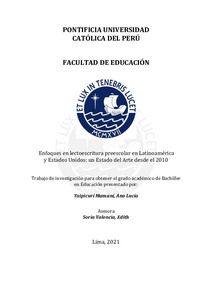Enfoques en lectoescritura preescolar en Latinoamérica y Estados Unidos: un Estado del Arte desde el 2010
Abstract
Aprender a leer y escribir es una experiencia significativa para todo niño y niña,
tomando mayor relevancia al llegar a la escuela primaria. Sin embargo, no todos viven
las mismas experiencias, ya que ello dependerá de distintos factores sociales,
culturales, económicos, etc. Uno de estos factores son las estrategias que el docente
usa para abordar la lectoescritura en el aula. Algunos maestros consideran seguir
usando estrategias tradicionales, mientras que otros experimentan implementar
nuevas alternativas en sus sesiones de clase. Dichas estrategias se sustentan en
distintos enfoques, los cuales desde una perspectiva indican al docente que camino
deben seguir para lograr el aprendizaje deseado. En tal sentido, el presente estado
del arte tiene por objetivo brindar una revisión documental actualizada acerca de los
enfoques que fundamentan las estrategias innovadoras que se llevan a cabo en las
escuelas de nivel inicial de distintos países de América Latina y Estados Unidos
durante los últimos 10 años. Los enfoques analizados son dos: el enfoque de
evaluación auténtica y el diseño universal para el aprendizaje. Ambos presentan ideas
que fueron adecuadas al ámbito de la lectoescritura tanto por docentes,
investigadores, entre otros profesionales al campo educativo. Al terminar el presente
análisis los docentes de nivel inicial e interesados en lectoescritura infantil
comprenderán a mayor profundidad los enfoques detrás de las nuevas prácticas de
lectoescritura. Lo cual, a su vez les brindará un mayor fundamento para replicar dichas
prácticas en sus instituciones adaptándolas a sus respectivos contextos. Learning to read and write is a significant experience for every boy and girl, taking on
greater relevance upon reaching primary school. However, not everyone has the same
experiences, as this will depend on different social, cultural, economic factors, etc. One
of these factors is the strategies that the teacher uses to approach literacy in the
classroom. Some teachers consider continuing to use traditional strategies, while
others experiment with implementing new alternatives in their classroom sessions.
These strategies are based on different approaches, which from a perspective indicate
to the teacher which way they should follow to achieve the desired learning. In this
sense, the present state of the art aims to provide an updated documentary review
about the approaches that underpin the innovative strategies carried out in preschools
in different countries of Latin America and the United States during the last 10 years.
The approaches analyzed are two: the authentic assessment approach and the
universal design for learning. Both present ideas that were adapted to the field of
literacy by teachers, researchers, among other professionals in the educational field.
At the end of this analysis, initial-level teachers and those interested in children's
literacy will understand in greater depth the approaches behind the new literacy
practices. This, in turn, will provide them with a greater foundation to replicate these
practices in their institutions, adapting them to their respective contexts.
Temas
Educación preescolar--América Latina
Educación preescolar--Estados Unidos
Comprensión de lectura--Estudio y enseñanza
Escritura--Estudio y enseñanza
Educación preescolar--Estados Unidos
Comprensión de lectura--Estudio y enseñanza
Escritura--Estudio y enseñanza
Para optar el título de
Bachiller en Educación
Collections
The following license files are associated with this item:






